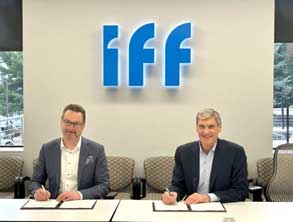Green tie-ups: Resonac/Microwave Chemical launch microwave-chemical recycling tech; Kemira/IFF in jv for biobased materials

Japanese firms Resonac Corporation and Microwave Chemical have jointly launched a project that plastics traditionally rely on fossil resources and emit significant amounts of CO2 during manufacturing and incineration at the end of their life cycle. While there are pyrolytic oil-conversion technologies that transform highly sorted or single-type used plastics into mixed oils (such as naphtha-equivalent oils) and chemical recycling technologies that convert them directly into basic chemical products like ethylene and propylene, the volumes of such sorted or single-type used plastics are limited.
Additionally, sorting and separating plastics incurs costs, and many types of plastics are difficult to separate. Therefore, establishing a chemical recycling technology that can thermally decompose used plastics, which are discharged in a mixed state, directly into basic chemical products without extensive sorting is expected to contribute significantly to further reductions in greenhouse gas (GHG) emissions.
Since 2022, Resonac and MWCC have been collaboratively working on the development of a technology that decomposes used plastics by irradiating them with microwaves to produce basic chemical products.
Microwave heating, which is also used in microwave ovens, transmits energy specifically to the target material. This technology focuses microwave energy on used plastics, enabling efficient decomposition into basic chemical products.
In this project, the companies will develop novel pyrolysis technology that directly converts and recycles actual mixed plastics into basic chemical products, aiming to produce useful basic chemicals with a yield of over 60 wt% (weight percent) and to reduce CO2 emissions during production to below 0.8 kg/CO2.
The companies also aim to establish recycling technology that can handle a variety of used plastics by conducting the pyrolysis of plastics using new methods such as microwave heating at a demonstration scale of several thousand tonnes per year.
Both companies have previously conducted experiments using model systems with virgin plastics, focusing on optimising decomposition reaction conditions and processes.
In a system of polyethylene (PE), polypropylene (PP), and polystyrene (PS), they achieved a yield of 80 wt% of useful basic chemicals.
In a more realistic system that includes polyethylene terephthalate (PET) and polyvinyl chloride (PVC), the yield reached 70 wt%.
In this project, the companies will first select the decomposition process and reactor types at the lab (experimental) and bench (small-scale prototype) levels, and then proceed with scale-up to pilot (medium-scale prototype) and large-scale demonstration levels while optimising the operation conditions.
In this project, Resonac will carry out the R&D activities, while MWCC will conduct investigations at the lab scale to bench scale using microwave heating for each of the developments as well as the basic design of pilot equipment.

In other news, Finland’s Kemira and IFF have announced that they have taken the final investment decision and move forward in forming a joint venture manufacturing company, known as Alpha Bio that will be integrated into IFF’s biorefinery at Kotka to produce renewable biobased products on a commercial scale. Total investment is estimated at around EUR130 million and commercial production is expected to start in late 2027.
Both companies will have a 50% stake in the joint venture. Kemira and IFF have been collaborating in a strategic partnership since 2020.
Designed Enzymatic Biomaterial (DEB) technology platform is a novel process technology utilising plant-based sugars which will provide access to many different applications. Kemira holds global exclusivity for the commercialisation of DEB biomaterial in the paper, board and water treatment markets.
The new manufacturing plant will be located at IFF Biorefinery in Kotka, Finland, to leverage available synergies and infrastructure as well as European biobased raw materials.
The facility will convert up to 44,000 tonnes of plant sugars to bioproducts, including sustainable, high-performance biopolymers for use in various applications and will be a platform material for further processing to make new renewable products.
The plant is designed to produce multiple grades of DEB biomaterial to accommodate various market applications. Approximately 30 direct new jobs are expected to be created in the Kotka region with additional job creation during the project’s construction phase – a significant positive development for the Kotka region economy.
(PRA)SUBSCRIBE to Get the Latest Updates from PRA Click Here»




